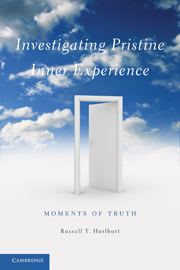Book contents
- Frontmatter
- Contents
- List of Figures and Tables
- Preface
- Acknowledgments
- 1 Moments of Truth
- 2 Fragmented Experience in Bulimia Nervosa
- 3 Apprehending Pristine Experience
- 4 Everyday Experience
- 5 Moments Are Essential
- 6 Experience in Tourette's Syndrome
- 7 The Moment (Not): Happy and Sad
- 8 Subjunctification
- 9 Before and After Experience? Adolescence and Old Age
- 10 Iteration Is Essential
- 11 Epistemological Q/A
- 12 A Consciousness Scientist as DES Subject
- 13 Pristine Experience (Not): Emotion and Schizophrenia
- 14 Multiple Autonomous Experience in a Virtuoso Musician
- 15 Unsymbolized Thinking
- 16 Sensory Awareness
- 17 The Radical Non-subjectivity of Pristine Experience
- 18 Diamonds versus Glass
- 19 Into the Floor: A Right-or-Wrong-Answer Natural Experiment
- 20 The Emergence of Salient Characteristics
- 21 Investigating Pristine Inner Experience
- Appendix: List of Constraints
- References
- Index
15 - Unsymbolized Thinking
Published online by Cambridge University Press: 05 June 2012
- Frontmatter
- Contents
- List of Figures and Tables
- Preface
- Acknowledgments
- 1 Moments of Truth
- 2 Fragmented Experience in Bulimia Nervosa
- 3 Apprehending Pristine Experience
- 4 Everyday Experience
- 5 Moments Are Essential
- 6 Experience in Tourette's Syndrome
- 7 The Moment (Not): Happy and Sad
- 8 Subjunctification
- 9 Before and After Experience? Adolescence and Old Age
- 10 Iteration Is Essential
- 11 Epistemological Q/A
- 12 A Consciousness Scientist as DES Subject
- 13 Pristine Experience (Not): Emotion and Schizophrenia
- 14 Multiple Autonomous Experience in a Virtuoso Musician
- 15 Unsymbolized Thinking
- 16 Sensory Awareness
- 17 The Radical Non-subjectivity of Pristine Experience
- 18 Diamonds versus Glass
- 19 Into the Floor: A Right-or-Wrong-Answer Natural Experiment
- 20 The Emergence of Salient Characteristics
- 21 Investigating Pristine Inner Experience
- Appendix: List of Constraints
- References
- Index
Summary
We have seen in previous chapters (bulimia in Chapter 2, Tourette's Syndrome in Chapter 6, a virtuoso in Chapter 14) that people, including scientists, are often dramatically unaware of salient (hay in the haystack) features of their experience. Against the argument that this blindness is characteristic only of special populations, in the present chapter and the next I present features of inner experience that are extremely common across ordinary people and yet are often unknown to the people themselves and to science. The present chapter discusses unsymbolized thinking; Chapter 16 discusses sensory awareness.
I believe that anyone who attends with adequate care to everyday experience as it is actually lived moment by moment will frequently come across experiences such as these:
Abigail is wondering whether Julio (her friend who will be giving her a ride that afternoon) will be driving his car or his pickup truck. This wondering is an explicit, unambiguous, “thoughty” phenomenon: It is a thought, not a feeling or an intimation; it is about Julio, and not any other person; and it intends the distinction between Julio's car and truck, not his van or motorcycle, and not any other distinction. But there are no words that carry any of these features – no word “Julio,” no “car,” no “truck,” no “driving.” Further, there are no images (visual or otherwise) experienced along with this thought – no image of Julio, or of his car, or of his truck. In fact, there are no experienced symbols whatsoever – Abigail simply apprehends herself to be wondering this and can provide no further description of how this wondering takes place. […]
- Type
- Chapter
- Information
- Investigating Pristine Inner ExperienceMoments of Truth, pp. 291 - 308Publisher: Cambridge University PressPrint publication year: 2011



